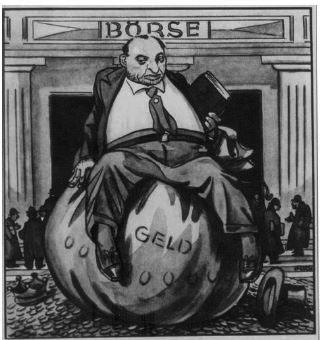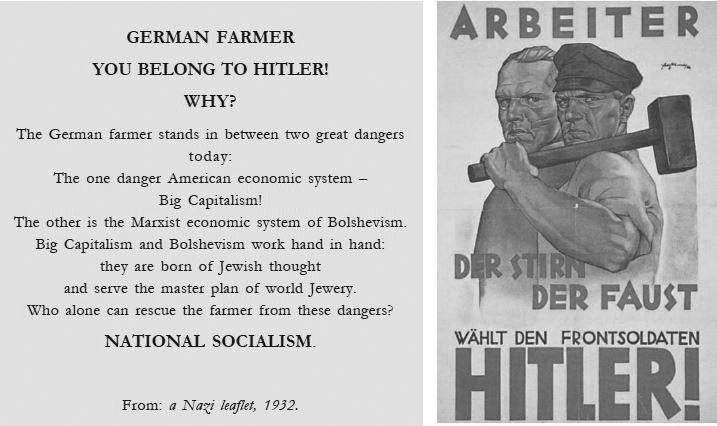Question 1:
Describe the problems faced by the Weimar Republic.
Answer:
In 1918, Kaiser Wilhelm II of Germany had abdicated and a provisional republican government
was
established under Friedrich Ebert. It was called the Weimar Republic. The new government
attempted
to follow democratic, liberal and socialist principles. It promulgated a new Constitution
called the
‘Weimar Constitution’ and established a federal system of government. The government gave
its
people several political rights. From the very beginning, the Weimar Republic was beset with
many
problems given as follows:
(i) Germany was economically very weak due to the heavy war reparations to be paid.
(ii) France had occupied the Ruhr region of Germany to forcibly pay the war indemnity.
(iii) The Weimar Republic could not fulfill the ambitions of the people. It was a weak
government
mostly with coalitions ruling at the Centre. The governments were dissolved very
frequently.
(iv) From 1924 to 1928, Germany had recovered a little. The Great Depression, however,
totally
destabilised the economy. The prosperity of some years came to an end.
(v) The profits from agriculture diminished. There was large scale unemployment in the
country.
Question 2:
Discuss why Nazism became popular in Germany by 1930.
Answer:
(i) Political situation in Germany: Germany had sought to satisfy her imperial ambitions
through war
but she had suffered a crucial defeat in the First World War. This led to the collapse of
the German
monarchy. Even though Germany had become a republic, the forces behind the monarchy—
the industrialists, the big landowners and the officers of the army remained quite powerful.
The
Weimar Republic was plagued by unstable governments and ineffective policies. The powerful
forces began to support the anti-democratic forces represented by Nazism to extend their
power and to check the power of the socialist movement.
(ii) Humiliating Treaty of Versailles: The Germans felt that the Treaty was Versailles was
extremely
humiliating. The victorious powers had imposed a huge war indemnity upon the Germans.
The Germans looked down upon Weimar Republic as they were responsible for signing such a
disgraceful treaty. The Weimar Republic was regarded as a symbol of national disgrace. When
Hitler assured the Germans about the restoration of old prestige, they became his
followers.
(iii) Personality of Hitler: Following Mussolini’s footsteps, Hitler had aimed to capture
power by
organising a march to Berlin. He attempted to seize control in the Beer Hall Putsch from
Munich,
but failed. He was put in jail for five years where he wrote his monumental work, Mein Kampf
to express his ideas and beliefs. He advocated the use of force and brutality and ridiculed
internationalism, peace and democracy. He also preached extreme hatred against the German
Jews who were blamed for all the ills of Germany. The ideas of Nazis were welcomed by
several
sections of the German society. Moreover, Hitler was a remarkable speaker who could easily
gather large crowds. His brilliant oratory was a crucial factor in enlisting huge support
for the
Nazis.
(iv) Economic crisis: The Wall Street Crash and the ensuing Depression affected almost all
the
countries of world. As a result of the crisis, eight million workers in Germany were
rendered
unemployed. This constituted half of the working population in Germany. Moreover, Germany
had to face very high rates of inflation and fall in their currency. In this situation, when
the Nazi
party promised to provide employment to the people and rebuild the economy, they readily
accepted the principles of Nazism.
Question 3:
What are the peculiar features of Nazi thinking?
Answer:
Principles of Nazism: The main ideas and principles of Nazism are given as follows:
(i) The state is supreme and all individuals should readily submit to enhance the power of
the state.
(ii) Nazism proposed one-party rule under the authority of a capable leader.
(iii) Military conquests and nationalist wars were supported by Nazism.
(iv) The Germans belonging to the Aryan race were most superior. The Jewish race should be
eliminated from the earth.
(v) All individuals should give up their rights and choices to fully serve the state. They
must duly
obey all laws and not question the authority of the government.
(vi) The state should play an important role in rebuilding the economy. Also, the government
should take steps to shape the opinion of the people through wide use of mass media.
(vii) Liberalism, socialism and communism must be rooted out.
(viii) The Nazi state has the power to regulate all aspects of individual life. Every human
action is
guided from Nazi way of life and thought.
(ix) The state should be a powerful entity. All lost territories must be brought back to the
Third
Reich.
(x) Any opponents or critics should be systematically purged or executed.
Question 4:
Explain why the Nazi propaganda was effective in creating a hatred for Jews.
Answer:
(i) The Nazis held Jews responsible for all their problems. In the midst of economic
instability, the
non-Jewish Germans started viewing Jews as their 'enemies'. The Nuremberg Laws of 1935
deprived Jews of their German citizenship and banned them from marrying non-Jews. Many Jews
were forced to live in the ghettos or wear a yellow star for identification.
(ii) In 1938, the Nazi workers attacked Jewish property and synagogues all over the country.
Some
30,000 Jews were arrested. It was the beginning of a full-scale massacre of Jews in Germany.
Over
the following seven years, about six million Jews were sent to concentration camps.
(iii) The Nazis used all forms of media like pamphlets, posters and images to popularise
their ideas.
The ‘enemies’ of the Nazi state were stereotyped as ‘harmful’ and ‘degenerate’. Films were
made
to deliberately spread hatred and resentment towards the Jewish population.
(iv) Hitler utilised the old notions of racial differences in order to disseminate his
thoughts. The
anti-Jewish (or anti-Semitic) sentiment was intensified by establishing the racial
superiority of the
Germans. The anti-Semitism thrived on the myth of purity of ‘Aryan’ races which put the
Blacks,
Gypsies and Jews at the bottom of the racial order.
Question 5:
Explain what role women had in Nazism. Write a paragraph comparing and contrasting the role of women during the French Revolution and Period of Nazism in Germany.
Answer:
The Nazis prescribed a different set of objectives and guidelines for women as compared to
men.
Under Nazi Germany, women were seen significant as they bore children and nurtured them.
They
had to be dutiful and responsibly manage their households. The women had to rear children
properly
and teach them Nazi values. Women were discouraged to make any relations with Jews or the
‘undesirables’. If they did so, they were severely dealt with.
Conversely, women had played an active role in the French Revolution. The new government
granted
several rights to the women. Steps were taken to uplift their status by educating and
training them.
Women obtained freedom to choose their partners for marriage, or file for divorce. In
France, there
was a strong movement to grant equal rights to women. They fought for voting rights as well
as
representation in the government. Their active involvement in the public and political
spheres since
the French Revolution remains an inspiration till now.
Question 6:
In what ways did the Nazi state seek to establish total control over its people?
Answer:
(i) The Nazis utilised the situation prevailing in Germany to their advantage and spread
their
influence. The Social Democratic Party and the Communist party, in spite of their large
number
of followers, failed to gain momentum with time. This contributed to the victory of the Nazi
movement in Germany. In the elections held in 1933, the National Socialist (Nazi) Party won
only 196 seats out of a total of 650 seats. Even though the Nazis did not gain majority,
Hitler was
still made the Chancellor of Germany by President Hindenburg.
(ii) Soon after coming to power, Hitler dismissed all the opponent political groups. He
succeeded
in banning most of the political parties. The anti-Nazi political leaders and activists were
carefully
eliminated. Hitler became all-powerful and ruled as a strong dictator in Germany.
(iii) Hitler assumed dictatorial power and took over all the powers in the government. Trade
unions
were dissolved. The socialist, communists and other suspected anti-Nazi leaders were
detained
in concentration camps. The Nazis then organised a planned campaign of humiliation and
persecution of the German Jews.
(iv) Hitler thought that the youth of the country should be educated about the Nazi
principles. There
were groups for children and youth organisations for men and women. The girls and boys were
given physical training and indoctrinated with Nazi philosophy. Besides, the German youth
was
required to compulsorily serve in the military for a few years.
(v) All forms of media and propaganda were effectively used by the Nazis to spread their
views.
The Nazi show of power and status was important in affecting the minds of the people. Also,
the hatred towards Jews and unquestioned loyalty towards the regime were ensured after
widespread propaganda. Any kind of criticism and opposition was not tolerated under the Nazi
rule.
Question 7:
Imagine that you are Helmuth. You have had many Jewish friends in school and do not believe that Jews are bad. Write a paragraph on what you would say to your father.
Answer:
If I were Helmuth, I would have pleaded to my father to not kill Jews brutally. Further, I
would have talked of basic human rights to be given to every individual irrespective of his
ethnic or racial status.
The right to live with respect should not be denied to anyone.
Question 8:
Read Sources A and B.
(i) What do they tell you about Hitler’s imperial ambition?
(ii) What do you think Mahatma Gandhi would have said to Hitler about these ideas?
Answer:
(i) Hitler strongly believed in the policy of imperialism and expansionism. He wanted to
enlarge
the size of Germany by occupying nearby territories. He glorified war and supported forcible
annexation of countries to make Germany a world power.
(ii) Mahatma Gandhi would have vehemently opposed such ideas. He was a believer of
non-violence
who stood against imperial conquest. Mahatma Gandhi would have severely criticised this
policy
of extreme nationalism.
Question 9:
How did the French Revolution and Nazism define citizenship.
Answer:
The French Revolution was based upon the principles of equality and fraternity which stressed on individual liberty. It sought to establish a state on democratic principles. The individual was given certain rights which the state could not infringe upon. On the other hand, the Nazi state was based on extreme nationalism and supreme power of the state. The individual rights and liberties were dissolved to regain the lost prestige and glory. All citizens were required to follow the state directives without any opposition. The French government, however, left scope for criticism and inquiry.
Question 10:
What did the Nuremberg Laws mean to the ‘undesirables’ in Nazi Germany? What other legal measures were taken against them to make them feel unwanted?
Answer:
The Nuremberg Laws were passed in 1935 which forbade German citizenship to all the Jews.
Marital and friendly relations between the Jews and non-Jews were declared criminal. Other
than
Jews, the physically disabled, Gypsies and Slavs were also regarded as ‘undesirables’ and
‘enemies
of the Nazi state’. Other legal measures against the ‘undesirables’ included confiscation of
their
assets and properties, and dismissal from government jobs.
Question 11:
If you were a student sitting in one of these classes, how would you have felt towards Jews?
Answer:
Jews are also human beings and deserve to live a life with dignity. (Answers may vary.)
Question 12:
Have you ever thought of the stereotypes of other communities that people around you believe in? How have they acquired them?
Answer:
Yes, the stereotypes about several communities and groups are very much present all around
us.
They are usually acquired from media, family discussions, education and interaction with
friends.
Question 13:
How would you have reacted to Hitler’s ideas if you were:
(i) A Jewish woman
(ii) A non-Jewish German woman
Answer:
(i) If I were a Jewish woman, I would be filled with fear and a sense of insecurity. I would
have been
extremely angry and hateful towards Hitler and the Nazis.
(ii) If I were a non-Jewish woman, I would have tried to save my fellow Jews against mass
persecution
for the sake of humanity. (Answers may vary.)
Question 14:
What do you think this poster is trying to depict?
Answer:
The given poster depicts Jews in a very bad light. They are stereotyped as selfish, money-minded and unscrupulous by nature.
Question 15:
Look at the images and answer the following:
What do they tell us about Nazi propaganda? How are the Nazis trying to mobilise different
sections of the population?
Answer:
The given leaflets appeals to the mass of workers and peasants. The Nazis sought to gain support for themselves by discarding all the other ideologies or points of view.
Question 16:
Why does Erna Kranz say, ‘I could only say for myself’? How do you view her opinion?
Answer:
Erna Kranz claims that this is her personal opinion. Her opinion is limited in its view since
the Nazis
committed grave human offences even though there was some economic development in the
country.
(Answers may vary.)



